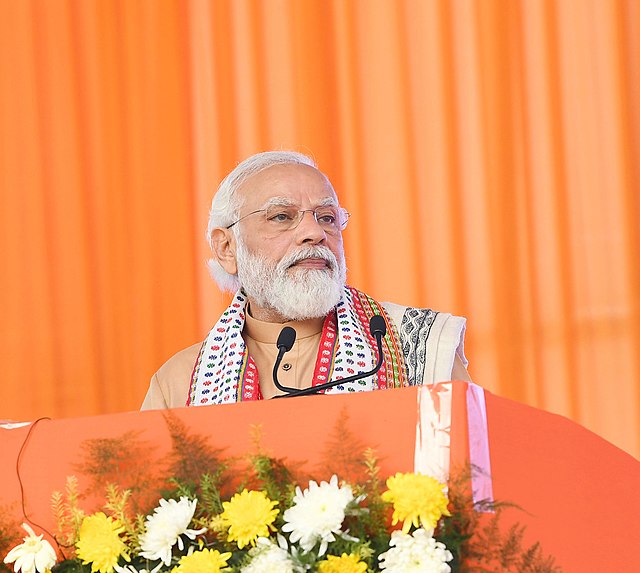Areeba Sherwani, a Research Associate at the Ayaan Institute argues that India’s election result is only a setback to the BJP project for India, not a defeat.
After a decade of absolute domination, the authoritarian Modi government has fallen short of a majority in the Lok Sabha election. For the last 10 years a single political party- The BJP, led a majority government at the centre, easily crossing the halfway mark of 272/543 in the general elections of 2014 and 2019. However, in 2024 the BJP won 240 seats, short of the majority mark of 272 by a distance. It will have to depend on its allies Telugu Desam Party (16 seats), Janata Dal (United) (12 seats), Shiv Sena (7 seats), and Lok Janshakti Party (5 seats), together bringing forty seats to the National Democratic Alliance (NDA) to form the government.
The BJP was aiming for 370 seats alone and 400 plus with the NDA, suffered major losses, from east to west. In the key state of Uttar Pradesh (UP), the target was to get 80 out of 80 seats, but obtained only 33 seats plus 3 with allies which was a major setback. The UP was meant to set the ball rolling for the Modi Government where in January of this year, Prime Minister Narendra Modi consecrated an elaborate Ram temple on the historic site of Ram’s birthplace in Ayodhya (UP), as described in ancient Hindu scriptures. This significant event was broadcast worldwide, marking a momentous occasion reminiscent of the widely viewed 1992 demolition of Babri Masjid. The temple’s consecration served as a symbolic and strategic starting point for Modi’s campaign for re-election in 2024, signaling his commitment to the cultural and religious sentiments of his supporters. Despite leveraging Ram Mandir for their election campaign, the BJP was not only defeated in Uttar Pradesh but also in Ayodhya, the very city where the temple is located.
The election results reveal that Brand Modi has lost some of its lustre, highlighting that even Mr. Modi is vulnerable to anti-incumbency. Contrary to the belief of many of his supporters, it shows he is not invincible. This development provides new optimism for the opposition and the potential for a revival of the democratic Republic after a decade of electoral autocracy.
How is the Modi magic fading?
Recent political maneuvers significantly impacted the BJP’s standing. On the eve of the elections, two non-BJP sitting Chief Ministers, Arvind Kejriwal and Hemant Soren, were arrested, and the bank accounts of the Congress party were frozen. Central agencies like the Enforcement Directorate (ED) and the Central Bureau of Investigation (CBI) selectively targeted opposition politicians, intensifying the perception of biased enforcement.
Additionally, there has been a persistent pattern of political horse-trading, with politicians from non-BJP parties defecting to the BJP and subsequently being absolved of any previous corruption allegations. These actions have contributed to an environment aimed at homogenizing India’s political landscape under the narrative of One Leader, One Party, One Religion. This strategy, rather than consolidating power, has led to a significant erosion of the BJP’s dominance, as reflected in recent electoral setbacks. The BJP’s recent campaign has centered more on inflammatory rhetoric than on developmental issues, employing slogans like “vote jihad” and claims that “Muslims will not spare even the mangalsutra of Hindu women.” Prime Minister Modi himself spearheaded this divisive strategy, accusing the Congress Party of intending to redistribute property to “those with many children,” a thinly veiled reference to Muslims, whom he labeled as “infiltrators.” Other BJP leaders exacerbated this narrative by insisting that Muslims in India must chant “Jai Shree Ram” or leave for Pakistan.
The BJP’s campaign slogan, “ab ki baar 400 paar,” meaning “this time we will cross 400 seats,” raised significant concern among liberals and the opposition. Achieving four hundred seats would grant the government the power to amend the constitution extensively. BJP leaders across the nation have explicitly linked their goal of securing four hundred seats to the intention of changing the constitution, stating that mere amendments would not suffice. The anxiety stems from fears that the BJP aims to transform India’s secular foundation into a Hindu Rashtra by removing the word “secular” from the preamble. Additionally, there is apprehension that they intend to weaken the judiciary, particularly the Supreme Court of India, which has recently functioned as a check on the government’s powers.
Another major concern is the potential elimination of reservations (education and employment quotas) for Other Backward Classes (OBCs) and other marginalized groups. These proposed changes represent a fundamental shift in India’s constitutional framework and democratic principles, prompting widespread alarm among those who value the nation’s secular and inclusive ethos. Joblessness, inflation, growing inequality, and a controversial army recruitment reform- The Agniveer Scheme angered the middle and lower middle-class section and further alienated the young voters.
During the 10-year reign of the BJP, in various speeches and rallies, Muslims were relentlessly targeted, with specific attacks on practices such as wearing hijabs and consuming halal meat. The BJP took measures like shutting down halal meat shops and closing madrasas, further inciting hate and communal tensions. The discourse even extended to endorsing the lynching of Muslims, aiming to stoke fear and animosity among the Hindu majority, which constitutes 80% of India’s population.
After ten years in power, one would expect the government to emphasize its developmental achievements. However, the focus on divisive and communal issues instead seems to have alienated voters, leading to dissatisfaction and a backlash at the polls. This shift away from a unifying agenda to one that foments division has not resonated well with the electorate, contributing to the BJP’s recent electoral challenges.
How did the BJP lose in Ayodhya despite Ram Mandir?
The party’s surprising defeat in Faizabad, which houses the Ram Mandir in Ayodhya, has hit headlines and sparked a debate. The BJP’s defeat came just a few months after the consecration ceremony of the new idol of Ram Lalla in the grand temple in Ayodhya.
There were growing murmurs of discontent as Ayodhya underwent development and the Ram temple construction progressed. While the temple project brought significant investment, the real beneficiaries were wealthy outsiders establishing hotels and resorts, rather than the local people. Many residents felt they were losing their land to large-scale projects without any tangible benefits. A major land fraud surfaced; implicating firms linked to BJP leaders in the sale of ecologically sensitive land to the Adani Group.
The construction of the Ram Path, a grand pathway to the temple, led to the demolition of 2,200 shops, eight hundred houses, thirty temples, nine mosques, and six mazaars, displacing numerous families without providing any rehabilitation or compensation. This sparked significant anger among the people of Ayodhya, who felt betrayed by the development plans that prioritized commercial gains over their welfare.
As a result, the BJP not only lost Ayodhya in the recent elections but also the surrounding constituencies, including Basti, Ambedkarnagar, and Barabanki. This outcome is being interpreted not merely as an electoral defeat for the BJP but as a significant blow to their Hindutva vision. The dissatisfaction of the local populace, who felt marginalized and ignored amidst grand development projects, played a crucial role in this political shift.
The Ayodhya result stands as a powerful indictment of the BJP’s approach, highlighting the disconnect between their grandiose plans and the grassroots realities faced by the people.
The Muslim Factor
India is home to the third largest Muslim population globally, accounting for more than 14% of its populace, and has seen this community underrepresented in both houses of Parliament, especially in the Lok Sabha. The 18th Lok Sabha in 2024 will include only 24 Muslim MPs, less than the 2019 figure of 26, and is the lowest in the House of 543 members since independence. Notably, among the 15 Muslim-majority constituencies in India, fourteen have secured seats this year. Political analysts attribute the declining number of Muslim legislators to opposition parties’ reluctance to nominate Muslim candidates since the BJP came to power in 2014. This hesitance is driven by fears of polarizing contests among different communities and losing seats, resulting in a decrease in Muslim candidates in each General Election.
Historically, elections have seen the Muslim vote divided by multiple Muslim candidates or by parties’ use of religiously favorable rhetoric. However, this year, the INDIA bloc strategically nominated non-Muslim candidates in many Muslim-majority constituencies, considering the specific needs of these areas, and received consolidated support from Muslim voters especially in Uttar Pradesh, voting for Samajwadi Party (an alliance of INDIA), became the key player in BJP’s downfall.
Over the past decade, continuous discrimination against Muslims, highlighted by events like the Citizenship (Amendment) Act, 2019 (CAA), the National Register of Citizens (NRC), the Shaheen Bagh protests, the enactment of the Uniform Civil Code in Uttarakhand, the hijab issue in Karnataka, and the misuse of sedition law (UAPA) against Muslim students and activists, has heightened political awareness among Muslims. These events have spurred them to make greater efforts to protect the Constitution and their rights.
Any success of the INDIA bloc is significantly influenced by Muslim voters who cast their ballots in favor of the alliance, prioritizing constitutional and democratic values over religious considerations. Muslim-dominated areas have seen high voter turnouts, with Muslim voters veering away from BJP and BSP, rallying behind the INDIA alliance, undistracted by other issues, and voting to safeguard the constitution and democracy.
Political analyst Mr. Kidwai noted, “The Muslim voter in 2024 has voted very carefully. They have tacitly stepped back and prioritized safety and security in their voting decisions. While they aspire for representation, their immediate concern is their safety and security, which has guided their decisive choices at the polls.”
The Revival of ‘The Idea of India’
This election is the epitome of the fact that concentration of power is no panacea for a federal India with mammoth diversity. It restores the balance of power between different political parties giving air to the opposition for checks and balances which hopes to restrain the government from passing controversial bills like CAA, Farm laws, GST, UAPA, etc., and hold the government accountable. Now the BJP will have to listen to its allies because they will be the key to a stable government. The INDIA, bloc needs to realise that this is not a victory for them, but an opportunity to define their politics and focus and voice the issues like unemployment, healthcare, education, caste census, inclusivity, etc.
Given the smaller difference in seat tallies between NDA (293) and INDIA (234), for the next five years the rival blocs have better chances to put the government under pressure and influence NDA allies, the JD(U) and TDP to break ranks, cross over and form the government. To protect the government from falling, reports says the BJP government is offering Lok Sabha Speaker post to TDP as the speaker’s post is paramount when it comes to proving majority or resolving disputes on the floor and mainly when anti-defection law comes into play where even Supreme Courts powers are limited. Prime Minister Narendra Modi is set to propose a candidate for the Lok Sabha Speaker on June 26 during a special session. Union Minister Rajnath Singh is expected to support the motion. Around five to six nominations will be considered but if the Opposition nominates its own candidate, an election will occur and this would be unprecedented in Independent India’s history, as the Speaker has always been chosen by consensus.
A coalition government, a strong opposition, independent Judiciary, free press and lots of hope, in this term may the Idea of India prevail.



Leave a Reply